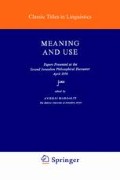Abstract
It is possible to make a reasonably clear distinction between intensionality with an s and intentionality with a t. Without putting too fine a point on it one can say that intensionality-with-an-s is a property of a certain class of sentences. A sentence is intensional if literal utterances of it have at least one interpretation where they fail to satisfy one or more of the standard tests for extensionality. The two tests most relevant to the present discussion are these: if existential generalization over the occurrence of referring expressions is not a valid form of inference or if the sentence fails to allow the substitution salva veritate of expressions which normally have the same reference, then it is intensional-with-an-s. Thus for example, the sentence “John is looking for the lost city of Atlantis” has at least one literal use to make a statement which does not entail that there is a lost city such that John is looking for it. And the sentence “The sheriff believes that Mr. Howard is an honest man” has a literal use to make a statement which together with the true statement that Mr. Howard is identical with Jesse James does not entail that the sheriff believes that Jesse James is an honest man. Because intensional sentences normally derive their intensionality from the occurrence of certain expressions it is possible to speak not only of intensional sentences, but also of intensional verbs, intensional contexts, etc. It is also possible to speak of intensional statements and intensional propositions. No doubt these two tests need some refinement to enable them to cope with sentences other than those used to make statements but the basic idea of intensionality-with-an-s seems reasonably straightforward.
Access this chapter
Tax calculation will be finalised at checkout
Purchases are for personal use only
Preview
Unable to display preview. Download preview PDF.
Notes
Zettel, § 56 and Remarks on Fraser, p. 5.
“Problems of Intentionality,” in: Phenomenology and Philosophical Understanding,E. Pivcevic (ed.), Cambridge University Press, 1975, p. 48.
It is a mistake to say that there are different senses of “belief,” a “notional” and a “relational” sense. Rather there are different kinds of reports of belief. One and the same belief can be reported in several different ways, e.g., “John believes truly that fa,” “John believes of a that fa,” and “John believes that fa.”
“Actions, Reasons, and Causes,” reprinted in: The Philosophy of Action, A. White (ed. ), Oxford University Press, 1968.
It is fairly easy to extend our criteria of intensionality to apply to intentional states. If the satisfaction of the state requires the existence of the objects represented and if the satisfaction value of the state is not altered by the substitution of other representations of the same object, then the state is extensional.
For an explanation of the notion of direction of fit, see J.R. Searle, “A Taxonomy of Illocutionary Acts,” in: Minnesota Studies in the Philosophy of Science 7 (1975): Language, Mind and Knowledge,K. Gunderson (ed.), pp. 344–369.
This looks as if it leads to an infinite regress but it does not. The understanding of the conditions of satisfaction of our intentional states is not an additional intentional state.
Author information
Authors and Affiliations
Editor information
Editors and Affiliations
Rights and permissions
Copyright information
© 1979 Springer Science+Business Media Dordrecht
About this chapter
Cite this chapter
Searle, J.R. (1979). Intentionality and the Use of Language. In: Margalit, A. (eds) Meaning and Use. Synthese Language Library, vol 3. Springer, Dordrecht. https://doi.org/10.1007/978-1-4020-4104-4_15
Download citation
DOI: https://doi.org/10.1007/978-1-4020-4104-4_15
Publisher Name: Springer, Dordrecht
Print ISBN: 978-1-4020-3263-9
Online ISBN: 978-1-4020-4104-4
eBook Packages: Springer Book Archive

